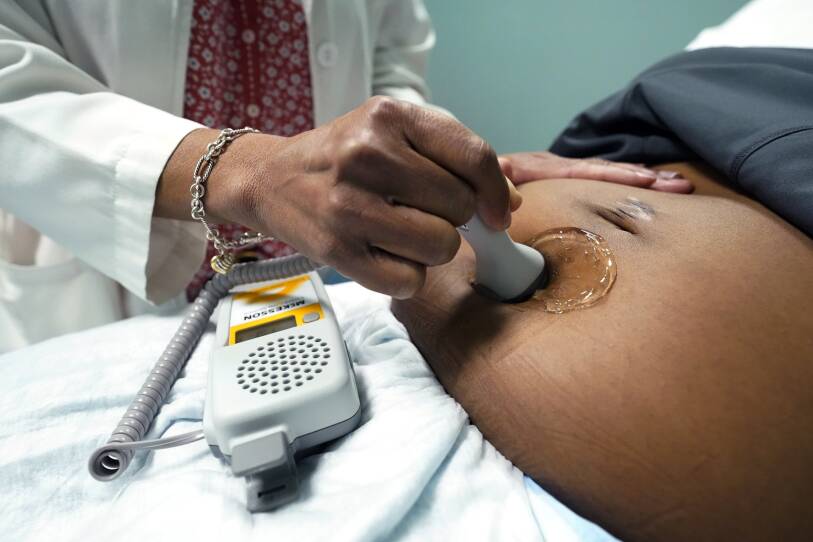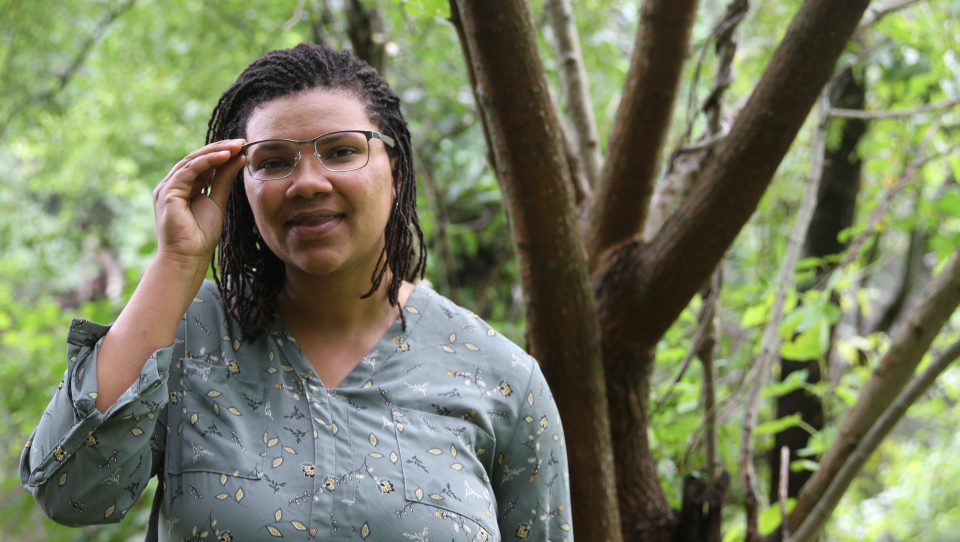Shantel Collins left the food and hospitality industry to get trained as a doula after she had an “amazing” doula experience during her pregnancy.
“I’ll never forget — I put together a birth option plan, which is kind of a written document of the preferences I have if my birth were to be ideal, like, everything went perfect,” Collins recalled. “And I remember being wheeled in on a wheelchair to my birthing room, and my nurse had my birth plan in her hand. And ... I was floored. Here I am, in the throes of active labor, and my nurse was already aware of what I preferred.”
Doulas aren’t health care professionals, but they help expectant parents with informational, emotional, physical and advocacy support. That can mean helping them prepare for decision-making during labor or connecting them with mental health resources. Doulas also can be a comforting and reliable presence for patients, whereas nurses or doctors will be in and out of the delivery room.
It’s been over two years since Collins finished her training as a doula. Now, about 80% of her clients are moms who, like her, are people of color.
“What I hear the most, which really breaks my heart, is, ‘I’m looking for a doula because I don’t want to die,’” she said. “And I hear it more often than I would like to admit.”
MassHealth plans to start covering doula services in late 2023, joining a fast-growing number of states that are turning to doulas in the face of a worsening maternal health crisis. Advocates, who have been pushing for the change for years, say the need is clear. In Massachusetts each year, about a third of all babies are born to mothers insured by MassHealth.
Marginalized women — those who are Black, brown, or disabled — are more likely to be on MassHealth. And they’re far more likely to suffer severe medical complications during labor, a disparity that’s only gotten wider. Across the board, severe complications during childbirth nearly doubled in the last decade, with Black women now more than twice as likely as white women to experience life-threatening conditions like heart attacks and sepsis.
Doulas could be part of the solution. Studies have found scores of benefits to births with doulas: lower rates of preterm births; lower rates of unnecessary cesarean sections; and, overall, higher satisfaction with labor and delivery for the parent.
“What I hear the most, which really breaks my heart, is, ‘I’m looking for a doula because I don’t want to die.’”Shantel Collins, birth doula since 2021
“Doulas aren’t just for white women to get a nice little backrub,” Collins said. “I became a doula so that you can get access to nutritional food. I became a doula so that you know how to ask a doctor the right questions to get the care that you need.
“Doulas are for everybody,” she said.
But it’s a service that Massachusetts mothers typically pay for out of pocket, according to a survey of over 130 doulas from the Betsy Lehman Center last year. By making doulas part of a health care plan, MassHealth hopes to bridge the gap for those who otherwise wouldn’t be able to afford those services.
How it will work
Doulas and advocates say that how, exactly, the new MassHealth coverage gets implemented will determine its success.
“What’s exciting about what's happening today is that we’re getting there,” said Lorenza Holt, who has been training doulas in Massachusetts for nearly 30 years. “What’s worrisome is that what MassHealth is recommending, at this point in time, is coming up short as far as compensation for doulas.”
She and others worry that doulas won’t enroll in MassHealth if the reimbursement rate is too low, which would keep doula services out of reach even if, under the policy, they’re supposed to be covered.
Right now, the state is proposing paying doulas up to $1,500 in total per client, which would cover several hours of visits before and after labor as well as $700 for the delivery. That rate would match what states like Oregon and Rhode Island provide under their state Medicaid plans.
How much doulas currently charge in Massachusetts varies widely — some doulas are volunteers, others charge based on sliding scales — but the Betsy Lehman survey found that costs range from $500 to $2,500 per client. More than three-quarters of those surveyed by the Betsy Lehman Center said they had trouble making a living wage as a doula.
Amy Chen, a senior attorney at the National Health Law Project, says that too-low reimbursement rates can cause challenges with finding a workforce.
“And then, on the flip side, if there is no workforce available, then I think it becomes really challenging for the health plans and the state Medicaid agencies to actually provide [doulas] as a viable service,” she said.
“Caring for vulnerable families requires more time, and more care, and more connection to additional resources,” Holt said. “So we shouldn’t be paying any less than the private doulas are paying for families that are more intact and more secure. We should be paying the doulas more.”
It’s hard to predict, though, what the demand for doulas will be once MassHealth coverage begins, or if there’s enough workers to meet it. Doulas aren’t universally licensed or trained, limiting the amount of research and data about the workforce. There is also little concrete information about how many people have a doula with them at their births.

From MassHealth’s point of view, there are still challenges to fostering workforce development and getting non-medical professionals certified in a system designed for health care providers. But there’s limitations on what MassHealth can do on its own.
“So much of this is so new,” said Sarah Krinsky, MassHealth’s senior manager of perinatal and maternal health policy, who is also a doula herself. “If I had a dime every time, in our internal meetings, we said, ‘We’ve never had to deal with this before. We’ve never had to address this question before,’ in the context of doulas? I would be rich.”
The concern is not only having enough doulas but having doulas who meet clients’ needs: primarily, who live nearby and speak the same language.
Advocates and researchers hope that legislation could fill in the workforce gaps. One bill, they hope, would help provide the infrastructure necessary for MassHealth’s doula program to succeed. It would create a workforce development fund, create an advisory committee to provide MassHealth with feedback, and affirm in law that patients have the right to have doulas in the delivery room. A committee hearing on the bill is scheduled for Sept. 20.
Hopes for the future
It’s not yet clear when doulas will actually become available to people on MassHealth.
Once MassHealth’s regulations are set later this year, it’ll likely take a few months for doulas to certify with the state. Doulas expect to run into challenges with setting up certification and billing in a system that’s built for health care professionals. Chen pointed to challenges like getting individual provider numbers and learning how to bill the correct codes under Medicaid.
“For the beginning, I would say some of the goals are quite basic,” Krinsky at MassHealth said. “A lot of folks may not have even heard of a doula before. So, obviously ... some of our MassHealth members, I think, will be thrilled to find out that they can actually get a doula because it’s a covered service. Others may say: ‘What’s a doula?’”
Krinsky added that getting doulas covered under MassHealth is going to be a “marathon not a sprint.” Changes to maternal morbidity or mortality might not show up in the data right away. But Krinsky and advocates all hope that the first year or two of the program will be a chance to enroll doulas in MassHealth, and build up the workforce.
“To be able to offer all MassHealth families in Massachusetts the services of a competent, loving, caring doula is a dream come true,” Holt said. “I think the health of our society is [dependent on] better birth outcomes, So, I hope we can get it right.”








